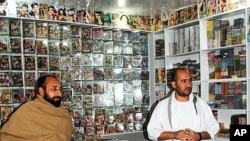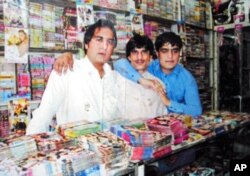Recent attacks on music stores and growing insecurity in Jalalabad are leaving residents in a state of fear and confusion.
In Zenadine’s mobile phone shop a recently taken photograph is taped to a glass case. In the photo Zenadine stands alongside his two cousins; CDs and DVDs line the racks and stack the counters. The shop in the photograph and the one he is standing in today are the same, with one noticeable difference. Today, CDs and DVDs are no longer for sale; mobile phones are.
Zenadine says he worked as a CD seller for 10 years and then one night, his friend called and told him an explosion occurred in front of his shop. He says three other nearby shops were also damaged.
In recent months, many music stores in the Afghan city of Jalalabad have been blown up, closed down or forced to sell different products. Those brave enough to remain open have hired security guards.
Most of the attacks have caused injuries to people and damage to shops. But one last week, the first so far this year, killed a 12-year-old boy from the neighboring district of Kama. The boy and his father came into the city to shop. Three others were also injured.
Zenadine lost more than $20,000 in the explosion and has taken out loans to start his new business selling phones.
Music store owners are alarmed by the attacks, particularly because no one knows who is responsible. One store owner looks to the street to see who might be watching as he talks about the attacks.
The store owner says everyone is in confusion; no one knows who these people are and the government is not taking serious action to help find out who is behind the attacks. One month ago, he says, the police came and arrested a man who, they said, was going to blow up a music store. But, the store owner continues, according to the news, the Taliban have not accepted responsibility and the police reported the suspect they arrested was from Pakistan.
Jalalabad, the conservative, Pashtun-dominated capital of Nangarhar province, is just over 100 kilometers from the country’s capital, Kabul. People here pride themselves on the Pashtun culture.
While many here say they enjoy listening to music, others are irritated by the music shops’ sales tactics - blaring loud music constantly.
Abdul Aziz Khairkhwa is a former deputy provincial council chief and is a mullah in one of the city’s mosques. He says loud music coming out of the shops in the bazaar is too extreme for such a conservative region.
He says in other countries if there is a music shop, a tape or a TV in someone’s house, it does not harm other people, but unfortunately in Afghanistan this is not true.
He is not saying they are behind the attacks, but the Taliban could be behind it. But, he continues, music store owners go to extremes so there is no need for a Taliban to attack a music store, ordinary people will do it.
Others speculate the attacks on shops could be part of disputes among provincial government officials and tribal or militia leaders.
Although people here do not seem to know who is responsible for the attacks on shops, they see them as linked to bigger security problems.
Aziz says there is no doubt that when the first elections took place (in 2004), 99 percent of the people took part. Today, he says, the security situation is worse. For more than one year, the security situation of Nangarhar has deteriorated and that, Aziz says, is a big problem.
Residents say in presidential elections in 2004 they supported the government and thought foreign forces would help improve life. Now many think, as one resident put it, the current government “is no better or worse than the Taliban.”
Many people complain of increased corruption, military searches of homes, civilian combat deaths and efforts to wipe out poppy crops without giving farmers new livelihoods.
There are those who say the greatest cause of insecurity in the region comes from across the border, in Pakistan.
The head of an education charity in Sherzad district, a Taliban stronghold, says the militants here are not from this area. He said, "The other people that come from the foreign countries come [to] our country and disturb our people."
When asked the nationality of the Taliban in Sherzad, the man, who asked not to be named, says “Pakistani, Pakistani.”
The Long War Journal, an online site tracking terrorism, says of Nangarhar’s 22 districts, Pakistani-based insurgent groups inhabit 10 of them.
As tensions and insecurity build here, music store owners say when they close their shops each night, they can be certain of only one thing - when they return the next morning, it could be their shop that has been blown up.





